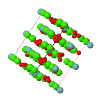issue contents
December 2002 issue

Cover illustration: The structure of remacemide nitrate (C17H21N2O+·NO3-) solved from powder diffraction data using a global optimization approach based on maximum likelihood. Only the remacemide molecule is optimized while the nitrate ion is treated as an unknown blur [Markvardsen, David & Shankland, Acta Cryst. (2002), A58, 316-326]. Image produced by Dr A. Florence, University of Strathclyde, Scotland, using POV-ray 3.1.
research papers
Download citation


Download citation


Orange polytypic crystals of mercuric iodide (HgI ) are fractal complications of the stable red HgI
) are fractal complications of the stable red HgI structure, exhibiting frequent stacking faults with an average thickness of ordered domains of 30 Å.
structure, exhibiting frequent stacking faults with an average thickness of ordered domains of 30 Å.
Download citation


Download citation


Metastable orange crystals of HgI present three types of structures built from Hg
present three types of structures built from Hg I
I supertetrahedra, that are corner-linked into a three-dimensional network or into layers that can be stacked in two different ways.
supertetrahedra, that are corner-linked into a three-dimensional network or into layers that can be stacked in two different ways.
New ferroelectrics are predicted among the structures with symmetry  and
and  using a systematic pseudosymmetry search. An empirical relation between the transition temperature and the atomic displacements in the case of proper ferroelectrics permits the estimation of the transition temperature for materials proposed as possible ferroelectrics.
using a systematic pseudosymmetry search. An empirical relation between the transition temperature and the atomic displacements in the case of proper ferroelectrics permits the estimation of the transition temperature for materials proposed as possible ferroelectrics.
Ferroelectric patterns of cation displacement together with simple tilting of the octahedral units in perovskite give rise to considerable structural variation. 61 possible structures are listed along with the pertinent group–subgroup relationships and an indication of which transitions between the different structures are allowed to be continuous.
Download citation


Download citation


The hydrostatic compression of piezoelectric single crystals of La3Nb0.5Ga5.5O14 and La3Ta0.5Ga5.5O14 was studied at pressures of up to 23 GPa in diamond-anvil high-pressure cells.
A method is developed for the analysis and classification of orthosilicates and their analogs Mx(TO4)y containing M cations and tetrahedral TO4 anions. First, the suprapolyhedral level of crystal structure organization was studied, where T tetrahedra were considered as templates for the condensation of M polyhedra. Using this methodology, the crystal structures of 54 orthosilicates and orthogermanates were analyzed within the first 12 coordination spheres of T nodes and were arranged into 21 topological types.
Download citation


Download citation


Lattice-dynamical calculations on the silicate garnet spessartine Mn3Al2Si3O12 are presented, with an evaluation of the atomic displacement parameters, vibrational spectra and thermodynamic functions.
Download citation


Download citation


The incommensurately modulated structure of the ferroelectric Sr Nb
Nb O
O is determined by single-crystal X-ray diffraction. The driving force for the modulation is found to be the internal strain around the Sr atoms.
is determined by single-crystal X-ray diffraction. The driving force for the modulation is found to be the internal strain around the Sr atoms.
Download citation


Download citation


Structure analysis of [(C2H5)n(C6H5)4−nP]2[TeBr6(Se2Br2)2] is presented for n = 1 and 0. The latter is an incommensurate one-dimensionally modulated structure with alternating cis- and trans- arrangements of the bromine atoms. The alternations are caused by modulation.
Download citation


Download citation


Single-crystal-to-single-crystal photoisomerization in two mixed cobaloxime complex crystals is reported. The enhanced photoreactivity of the 2-cyanopropyl and the 2-cyanoethyl groups in the mixed crystal is well explained qualitatively and quantitatively by conformational change of the reactive groups and by the size of the reaction cavity.
Download citation


Download citation


The meta-dinitrobenzene crystal structure and thermal expansion and a rigid-body analysis of its anisotropic displacement parameters are studied over the 100–300 K temperature range. Ab initio calculations evaluate the vibrational contribution to the static first-order hyperpolarizability of the molecule.
Download citation


Download citation


The unusual solid–solid phase transition (β → α) preserving the single-crystal form of acetonitrile, CH3CN, has been studied. Single crystals of the β form transform to single crystals of the α form when warmed through the transition.
Download citation


Download citation


Topological analysis of the electron density in 2-thiocoumarin crystals using a multipole model fitted to the experimental X-ray diffraction data at 90 K is presented and the dipole moment components are compared with those obtained from theoretical estimates.
Download citation


Download citation


The crystal structure of phenol (C6H5OH) at 0.16 GPa has been determined using a combination of single-crystal X-ray diffraction techniques and ab initio density-functional calculations. In contrast to the ambient-pressure phase, in which the molecules are linked by OH⋯O hydrogen bonds into a pseudo-threefold helix, chains are formed about 21 and pseudo-21 screw axes.
A survey of the O—H⋯O bonds in vic-diols CnHm(OH)2 reveals a variety of hydrogen-bonding patterns. The space-group frequencies are anomalous for the half of the vic-diols that form complete, or almost complete, sets of O—H⋯O bonds.
Download citation


Download citation


The low-temperature crystal structure of the p-tert-butylcalix[4]arene–toluene inclusion compound exhibits significant guest-induced distortion of the host calixarene molecule. Remarkably, the space group and unit cell that best describe the structure appear to depend on the wavelength of the incident radiation.
Download citation


Download citation


Mefenamic acid and β-cyclodextrin form a monomeric inclusion complex. Mefenamic acid is partially included in β-cyclodextrin with either the xylyl or the benzoic-acid moiety inside the cavity.
Download citation


Download citation


The crystal structures of two diastereomeric salts are investigated. Differences in solubilities between the two salts are related to differences in enthalpy and entropy of the crystals.
Download citation


Download citation


The requirements of hydrogen bonds that involve the guanidyl group appear to affect the frequency of occurrence of different arginine conformations. The aggregation pattern in the DL-arginine complex exhibits varying degrees of resemblance to patterns in similar structures while that in the L-arginine complex is observed for the first time.
Download citation


Download citation


The crystal structures of five hemiadducts of paracetamol with 1,4-dioxane, N-methylmorpholine, morpholine, N,N-dimethylpiperazine and piperazine and a related 1:1 adduct of paracetamol with 4,4′-bipyridine are described. All structures are characterized by the formation of chains of paracetamol molecules, linked via either OH⋯O=C or NH⋯O=C interactions, depending on the presence or absence of substituent groups on the guest molecule.
Download citation


Download citation


The syntheses and crystal structures of six new cis-ansa derivatives N3P3Ph2[O(CH2CH2O)4]R2 (R = Cl, OCH2CF3, OPh, OMe, NHPh, NHBut) are reported and the observed relationship between molecular parameters of the N3P3 ring and substituent basicity constants is discussed.
book reviews
Free 

Free 

books received
Free 



 journal menu
journal menu









































